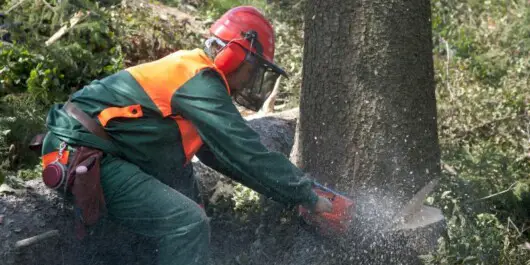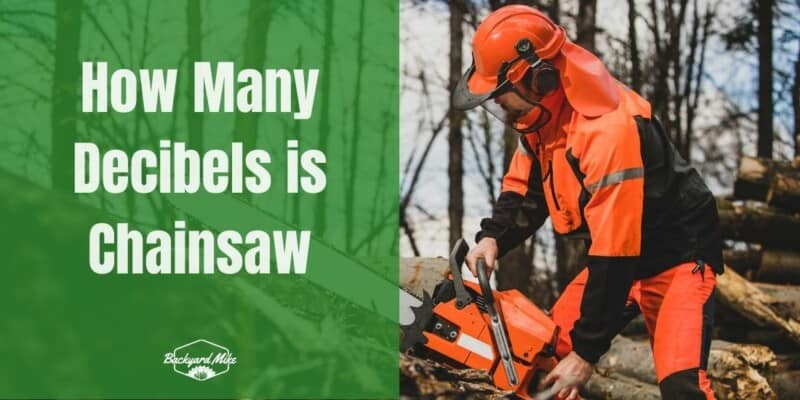Are you worried about the effect chainsaw sound has on your hearing and want to find out exactly how much sound does it make? If yes, then this is the right place for you to be.
How many decibels is chainsaw is a common question chainsaw users who have to use their machine for long periods of time have. The average noise of a decent-quality chainsaw is between 106 to 120 decibels. Modern chainsaws could be as silent as 106dB. However, this isn’t actually as silent as you expect. This is because 106dB is still a lot louder than the normal level of speech. This is also a number that has the potential to cause hearing damage when used for longer durations of time. Meanwhile, the loudest level that a chainsaw can reach is 120dB, which is incredibly dangerous and can cause irreversible hearing damage.
In this guide, you will get to know all about the noise levels of chainsaws, how many decibels is chainsaw, how to manage the noise levels of your chainsaw, and more. Stick around to get all the answers that you are looking for.
How Does Human Hearing Work
Hearing is one of the most important and significant abilities that humans have. Therefore, it is no wonder it is such a complex task. Before determining how many decibels is chainsaw, you first need to know how human hearing works.
When any sound is produced, the outer ear captures this sound. The sound will travel through the ear canal before reaching the eardrum. Once the sound hits the eardrum, it vibrates. In doing so, the sound moves three tiny bones that are connected on one side to the eardrum and the other side to the inner ear.
The movement of the bones will make the fluid in the inner ear move. As the cochlea fluid moves, minuscule hair cells send electric signals to the hearing nerve present in the brain. The brain interprets the electric signal and tells you what you have just heard.
The most amazing thing about the intricate way hearing works is that all the actions mentioned here happen so fast that you can instantly tell what a certain sound is.
As complex as hearing is, it still comes with its limits.
Humans cannot actually hear sounds that are less than 0dB and sounds that are on certain frequencies. Additionally, exposure to sounds above 80 to 90 decibels can cause hearing damage, while sounds above 120dB could make you permanently lose your hearing.
How Many Decibels is Chainsaw
The average noise level of a chainsaw is between 106 decibels and 120 decibels. The modern chainsaws released recently can sound as little as 106 decibels. However, this isn’t actually little or that silent at all. This is because 106 decibels is significantly loud compared to the normal level of speech. Moreover, it is a noise level that has the potential to give you hearing damage or hearing loss within seconds.
The loudest noise level that a chainsaw can reach is 120 decibels. This is an extremely dangerous level that can cause irreversible hearing damage after just a few seconds of exposure, or give hearing loss if you aren’t wearing any form of hearing protection.
It is advised that you should always wear hearing protection anytime you’re exposed to noise levels exceeding 85–90 decibels if you’re looking to preserve your hearing.
How Loud is a Chainsaw compared to other Sounds
Here is a comparison of how chainsaw decibel levels rank and compare to the decibel levels of other sources of sound –
- The chainsaw sound is 16 to 32 times louder than the normal level of conversation
- The chainsaw decibel levels are 8 to 16 times louder than the average sound level of freight trains heard from 100 feet away
- The chainsaw sound is 4 to 8 times louder than the sound of a hairdryer or a food blender
- The chainsaw sound levels are 2 to 4 times louder than the average noise level of construction sites
- The sound of a chainsaw can be as loud as a rock concert
- The chainsaw decibel levels are 2 times less loud than the jet engine takeoff heard from almost 200 feet away
As you can notice, when compared to other sources of sound, a chainsaw is an extremely loud machine. Therefore, it wouldn’t be safe for your ears if you aren’t using noise protection.
Can Chainsaw Noise Levels Result in Hearing Loss
Yes, chainsaw noise levels can easily cause hearing loss if you aren’t wearing proper hearing protection. Exposure to even a few seconds of chainsaw noise levels between 106 dB, and 120 dB without wearing hearing protection could instantly damage your hearing or even result in hearing loss.
If you have, at any time, been exposed to chainsaw decibel levels (106 to 120 dB), you need to wear earmuffs, earplugs, or sound-canceling headphones. Noise protection will protect your ears from potential hearing loss or irreversible damage. If you aren’t able to wear an ear protection device, you should increase the distance between yourself and the source of the sound for reducing its intensity.
Wearing ear protection will be necessary when you’re working in any business that has noise pollution, especially in the forestry industry. The Occupational Safety and Health Administration (OSHA) requires proper ear protection must be provided in businesses that experience exposure to noise pollution. This also includes forestry operations, construction sites, or any work that requires the use of chainsaws.
What Chainsaw Decibel Levels are Acceptable to Neighbors
The acceptable chainsaw decibel level that neighbors can accept will depend on the distance between the sound source and the measurement point. If your neighbor is using a chainsaw, and you wish to determine if they are within the acceptable limits, you will need to see what the decibel readings are at your property limit.
Generally, residential neighborhoods have a noise limit of 70dB, with an even lower limit at night. To know the specific limit that applies to your neighborhood, you will need to consult the local authorities.
The noise levels of chainsaws can pose problems not just for you, but for your neighbors as well. Unfortunately, there isn’t a lot that you can do to reduce the noise of the chainsaw to prevent disturbing your neighbors. The main reason for that is, chainsaws make use of air and gas-powered engines, which run at incredibly high speeds. To make these machines lighter weight, most chainsaw manufacturers choose not to enclose them in sound-dampening casings.
When you have to use a chainsaw, you can always inform your neighbors or anyone else living nearby. This way, your neighbors will be prepared and not get as disturbed. If you’re using a chainsaw in a congested area or neighborhood, it is recommended that you should give others notice that you will be using a chainsaw. When you do use the chainsaw, you should try and do your job quickly so that you can keep the noise to a minimum.

How to Manage the Chainsaw Sound Levels
The chainsaw has a visceral sound that can be extremely nerve-wracking. The chainsaw noise can be easily compared to the sound of a helicopter. However, considered the most demanding tool, chainsaws can be used everywhere for pruning and cutting trees. Hence, its sound production level could exceed and if experienced for a longer period, it could cause serious trouble.
As stated earlier, the sound of a chainsaw will be around 106 to 120 dB. After evaluating the human sound tolerance chart, it is clear how a useful tool like this can threaten normal human functioning.
Moreover, a handyman’s experience of noise exposure goes beyond standard time. Therefore, using protection for hearing and reducing noise exposure will be necessary Moreover, identifying the right equipment maintenance and management will help keep your ears safe and sound.
In order to prevent high noise output from your chainsaw, you can try following these tips to maintain and manage your chainsaw.
- Maintain your chainsaw by keeping the chain sharp and oil flow proper so that additional noise isn’t created by blunt functioning
- Tune the engine and check that it is running smoothly throughout the cutting process or not (it should not work only at increased RPM)
- Keep the air filter clean while preventing it from getting dusty (remember to change the air filter before and after every cutting season)
- Check the baffle condition to make sure there is consistent fuel flow to the chainsaw chain and bar (in case the baffles are rusty, or they have a hole, they will end up producing more noise)
- Fix or bolt the muffler to the engine block family while also checking if there are any holes, splits, or rusts (clean or replace the muffler in case you find any rust or holes respectively)
After you have analyzed your chainsaw thoroughly, you should try the mentioned tips to get a better working experience –
- You should reconsider the type of chainsaw you are using (for instance, make use of an electric chainsaw that is less noisy and capable of giving a similar cutting experience)
- You can even use shears, handsaws, and reciprocating saws (battery-powered or electric) to cut trees and prune logs
- You shouldn’t utilize the machine more than its capacity and make sure that you are cutting trees without going up to standard chainsaw rev
- Power off or switch off your chainsaw after specific intervals so that you can keep it cool and effective, which can easily result in less noise
What Level of Ear Protection will be Best for Chainsaw Users
New chainsaw users might not know which level of ear protection they need to go for. Ear protection will be necessary when you’re using chainsaws so that you can avoid hearing loss. Essentially, there are two levels of ear protection that are used commonly – noise-canceling earmuffs and heavy-duty earplugs (such as the ones used by construction workers). It would be best to wear earplugs or muffs that have the highest possible decibel rating when you’re operating a chainsaw.
Wearing proper protection is necessary because chainsaw usage can cause ear damage over time with regular use. If you’re not careful, chainsaw use can sometimes make you near deaf or even permanently deaf.
Losing your hearing won’t happen all at once. If you’re exposed to chainsaw noise frequently enough, your hearing will eventually be affected over time. There are two types of sounds that can damage your hearing. These include short-term and long-term exposure to loud noises produced by chainsaws. This is especially true if you’re running a chainsaw continuously for long periods of time without hearing protection.
If you are looking to keep yourself safe from the sound of the chainsaw, you can do so by using the essential protective equipment before you start cutting trees with your chainsaw. Moreover, it would help if you have practiced the following advice to overcome the chainsaw noise consequences –
- Using proper ear protection will be the easiest way of reducing chainsaw decibels. Therefore, you will need to choose the right pair of earmuffs that can reduce the decibels to 80-85 dB (tolerable).
- Instead of working constantly, you need to take short breaks after every 20–30 minutes and avoid potentially high chainsaw sounds.
- Avoid contacting other workers during the cutting process and save yourself from experiencing high noises constantly.
FAQs
How many decibels is a gas-powered chainsaw?
Gas-powered chainsaws tend to be more noise-producing compared to other chainsaws. The estimated decibel value of sound that gas-powered chainsaws produce is 110 to 120 dB.
How many decibels is a battery-powered chainsaw?
Battery-powered chainsaws produce less noise when compared to their gas-powered counterparts. However, the working potential of electric chainsaws is quite reduced, as battery-powered chainsaws cannot work as effectively as gas-powered ones. The only plus point is that battery-powered saws have reduced sound decibels, up to 10-30 dB.
How long can you use a chainsaw without ear protection?
For starters, you should not be using the chainsaw even for a second without ear protection, as the chainsaw produces a lot of noise when working. The sound intensity of a chainsaw is between 106 dB and 120 dB. Without proper hearing protection, running a chainsaw for just 2 minutes could result in hearing loss.
Is 120 dB very loud?
Yes, 120 dB is incredibly loud. Sound is usually measured in decibels (dB). A whisper is around 30 dB, normal conversation is around 60 dB, while a motorcycle engine is around 95 dB. Noise levels above 70 dB over a prolonged period of time might start damaging your hearing gradually. Loud noise above 120 dB will cause immediate harm to your hearing.


